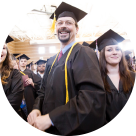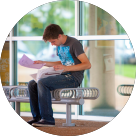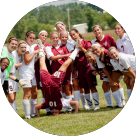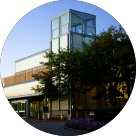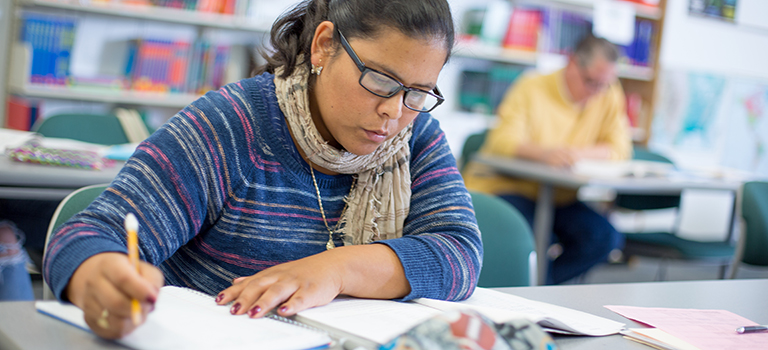Associate of Arts General Education Requirements (CORE 42)
Complete at least 42 credit hours, distributed among the Knowledge Areas listed below
SCC Institutional Requirements to Earn an Associate of Arts Degree:
Complete a minimum of 64 credit hours, including 42 credit hours of general education courses adhering to the minimums as listed above.
Complete one of the following courses: BTC-103, CPT-103, CPT-115 or EDU-220.
Earn a cumulative grade point average of 2.0.
Complete a minimum of 15 credit hours at SCC.
Complete 1-Credit College 101 Course
State-Level Goal
To develop students' understanding of themselves and the world around them through study of content and the processes used by historians and social and behavioral scientists to discover, describe, explain, and predict human behavior and social systems. Students acquire an understanding of the diversities and complexities of the cultural and social world, past and present, and come to an informed sense of self and others. As part of this goal, institutions of higher education include a course of instruction in the Constitution of the United States and of the state of Missouri and in American history and institutions (Missouri Revised Statute 170.011.1).
Suggested Competencies
Students will demonstrate the ability to:
- Explain social institutions, structures, and processes across a range of historical periods and cultures.
- Develop and communicate hypothetical explanations for individual human behavior within the large-scale historical and social context.
- Draw on history and the social sciences to evaluate contemporary problems.
- Describe and analytically compare social, cultural, and historical settings and processes other than one's own.
- Articulate the interconnections of people and places around the globe.
- Describe and explain the constitutions of the United States and Missouri.
State-level Goal
To prepare students to communicate effectively with writing that exhibits solid construction resulting from satisfactory planning, discourses, and review. Students will understand the importance of proficient writing for success in the classroom and the workforce.
Suggested Competencies
Students will demonstrate the ability to:
- Demonstrate critical and analyatical thinking for reading, writing, and speaking.
- Compose sound and effective sentences.
- Compose unified, coherent and developed paragraphs.
- Understand and use a recursive writing process to develop strategies for generating, revising, editing and proofreading texts.
- Produce rhetorically effective discourse for subject, audience, and purpose.
- Demonstrate effective research and information literacy skills.
State-level Goal
To prepare students to communicate effectively with oral presentations that demonstrate appropriate planning and expressive skills. Students will understand the role of public speaking for success in the classroom and society.
Suggested Competencies
Students will demonstrate the ability to:
- Use productive imagination for the discovery and evaluation of appropriate arguments relating to a chosen topic through effective research
- Will demonstrate they understand the basic process of audience analysis
- Use, identify, and create speeches for different types of speaking purposes,
- Demonstrate effective preparation skills in the organization of speeches into three appropriate sections and preparing each section using the appropriate information and transitions between information and sections.
- Utilize and understand the patterns of organization to structure information for each specific type of speech. Students will use parallel ideas and information on different levels of abstraction in these patterns.
- Demonstrate effective skill at composing and developing arguments with appropriate support that is unified, coherent and fully developed utilizing the tenets of good writing and research.
- Understand the complex issue of good delivery and show improved personal confidence and the ability to manage communication apprehension.
- Demonstrate effective listening skills as it relates to critical understanding of speech topics and critique of that speaking.
- Demonstrate that they understand and take part in ethical speaking and listening during presentations.
- Understand communication ethics for both speech preparation and critiquing of peer speeches by utilizing responsible research and citing sources, preparing speeches with integrity when dealing with information and sources, and using emotional and logical appeals responsibly.
- Demonstrate and understand the role of public speaking in citizenry and how public speaking can contribute to success in the classroom and society.
State-level Goal
To develop students' understanding of the principles and laboratory procedures of the natural sciences (Life and Physical) and to cultivate their abilities to apply the empirical methods of scientific inquiry. Students should understand how scientific discovery changes theoretical views of the world, informs our imaginations, and shapes human history. Students should also understand that science is shaped by historical and social contexts.
Suggested Competencies
Students will demonstrate the ability to:
- Explain how to use the scientific method and how to develop and test hypotheses in order to draw defensible conclusions.
- Evaluate scientific evidence and argument.
- Describe the basic principles of the natural world.
- Describe concepts of the nature, organization, and evolution of living systems.
- Explain how human interaction(s) affect living systems and the environment
State-level Goal
To develop students' understanding of fundamental mathematical concepts and their applications. Students should develop a level of quantitative literacy that would enable them to make decisions and solve problems and which could serve as a basis for continued learning.
Suggested Competencies
Students will demonstrate the ability to:
- Describe contributions to society from the discipline of mathematics.
- Recognize and use connections within mathematics and between mathematics and other disciplines.
- Read, interpret, analyze, and synthesize quantitative data (e.g., graphs, tables, statistics, survey data) and make reasoned estimates.
- Formulate and use generalizations based upon pattern recognition.
- Apply and use mathematical models (e.g., algebraic, geometric, statistical) to solve problems.
State-level Goal
To develop students' understanding of the ways in which humans have addressed their condition through imaginative work in the humanities and fine arts; to deepen their understanding of how that imaginative process is informed and limited by social, cultural, linguistic, and historical circumstances; and to appreciate the world of the creative imagination as a form of knowledge.
Humanities & Fine Arts: Objectives
Students will demonstrate the ability to:
- Describe the scope and variety of works in the humanities and fine arts (e.g., fine and performing arts, literature, speculative thought).
- Explain the historical, cultural, and social contexts of the humanities and fine arts.
- Identify the aesthetic standards used to make critical judgments in various artistic fields.
- Develop a plausible understanding of the differences and relationships between formal and popular culture.
- Articulate a response based upon aesthetic standards to observance of works in the humanities and fine arts.

